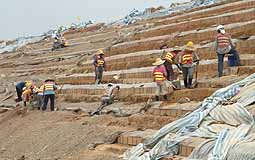 |
| Men at work: Construction works for Hong Kong Disneyland provide about 11,000 jobs. Upon its opening in September, the theme park and the associated hotel, catering and retail businesses will employ 18,000 people. |


|
The Government will continue to find ways to combat joblessness, Chief Executive Tung Chee Hwa noted in his Policy Address.
"As the economy picks up, we expect a further drop in the unemployment rate this year. However, as a result of globalisation, structural unemployment has been caused by a serious mismatch of human resources," he said.
The average unemployment rate for jobs requiring high academic qualifications and skill levels stands at 2.5% to 3%, representing full employment. The logistics management, purchasing, information technology and financial services sectors are experiencing an increasingly tight manpower situation and salaries are beginning to rise.
On the other hand, low-skilled jobs are in short supply, with the related unemployment rate still standing at 7.5% on average. A manpower projection study conducted in 2003 estimated that by 2007 Hong Kong's workforce would face a shortage of more than 100,000 well-educated persons but a possible excess of 230,000 workers with relatively low education.
The Government encourages job seekers and employees to upgrade themselves by learning, Mr Tung said. Educational institutions now offer additional associate degree programmes and diploma courses. The Vocational Training Council and the Employees Retraining Board will continue to improve and modify their courses to meet the employment market's demands.
Programmes help young people find work
Through the implementation of the Youth Pre-employment Training Programme, the Youth Work & Experience Training Scheme and other initiatives, young people can continue to get training to help them enter the job market and develop their potential.
More than 200,000 people are still unemployed. "We must face up to this problem. The prime consideration of our governance is to promote employment. Our first task is to promote economic growth," Mr Tung said.
He gave tourism as an example, citing the construction works for Hong Kong Disneyland that provide about 11,000 jobs. Upon its opening in September, the theme park and the associated hotel, catering and retail businesses will employ 18,000 people.
About 36 new hotels will be completed between now and 2008, employing more than 10,000 workers in their construction, and creating about 8,000 service-related jobs upon their opening.
The development of tourism will also result in more jobs in the retail and catering sectors. The two airlines in Hong Kong will increase their fleets and employ 3,000 more people over the next two years, he said.
Capital works projects create jobs
The Government will continue with its average annual allocation of $29 billion for capital works, providing employment for about 4,200 professionals and technicians and 41,000 construction workers each year.
Having considered the needs of districts that have seen increasing populations, the Government has identified 25 priority leisure and cultural facilities to be built over the next few years, including a combined library and recreation centre in Tin Shui Wai and a swimming pool complex in the new town of Tung Chung.
These 25 projects will cost $4.4 billion and create several thousand jobs.
It will also implement make-work projects, such as the promotion of urban renewal and redevelopment, greening initiatives, decking of nullahs and promotion of the environmental industry. About 10,000 temporary contract jobs in the public sector will be extended to meet operational needs, Mr Tung said.
The Government will also crack down heavily on employers under its service contracts that offer non-skilled workers wages that are lower than average market rates.
Combating illegal employment
The Government will step up publicity and law enforcement to clamp down on illegal workers. In 2004, law-enforcement agencies staged 30% more joint operations than in 2003. They arrested more than 5,000 illegal workers and more than 1,300 employers suspected of employing illegal workers.
"More than 200 of these employers were sentenced to immediate imprisonment on conviction, more than double the number in 2003. We will continue strict law enforcement," Mr Tung said.
Officials were also studying ways to strengthen measures to eliminate illegal workers in the construction, renovation and associated trades.
Wages, working hours under discussion
Persistently high unemployment has led to intensified competition for jobs, driving down wages and lengthening working hours for some workers. This has prompted lawmakers to debate the issues of "maximum working hours" and "minimum wage".
"Public views are also divided. We have to build a consensus through objective analysis and rational discussion. We also have to fully evaluate whether implementing various measures will bring real benefits to workers, and not the opposite effect. The Government will keep an open mind and listen to views from various sectors in the community," Mr Tung said.
The Labour Advisory Board has begun discussions on the issues and will study them in detail, he added.
Go To Top
|



